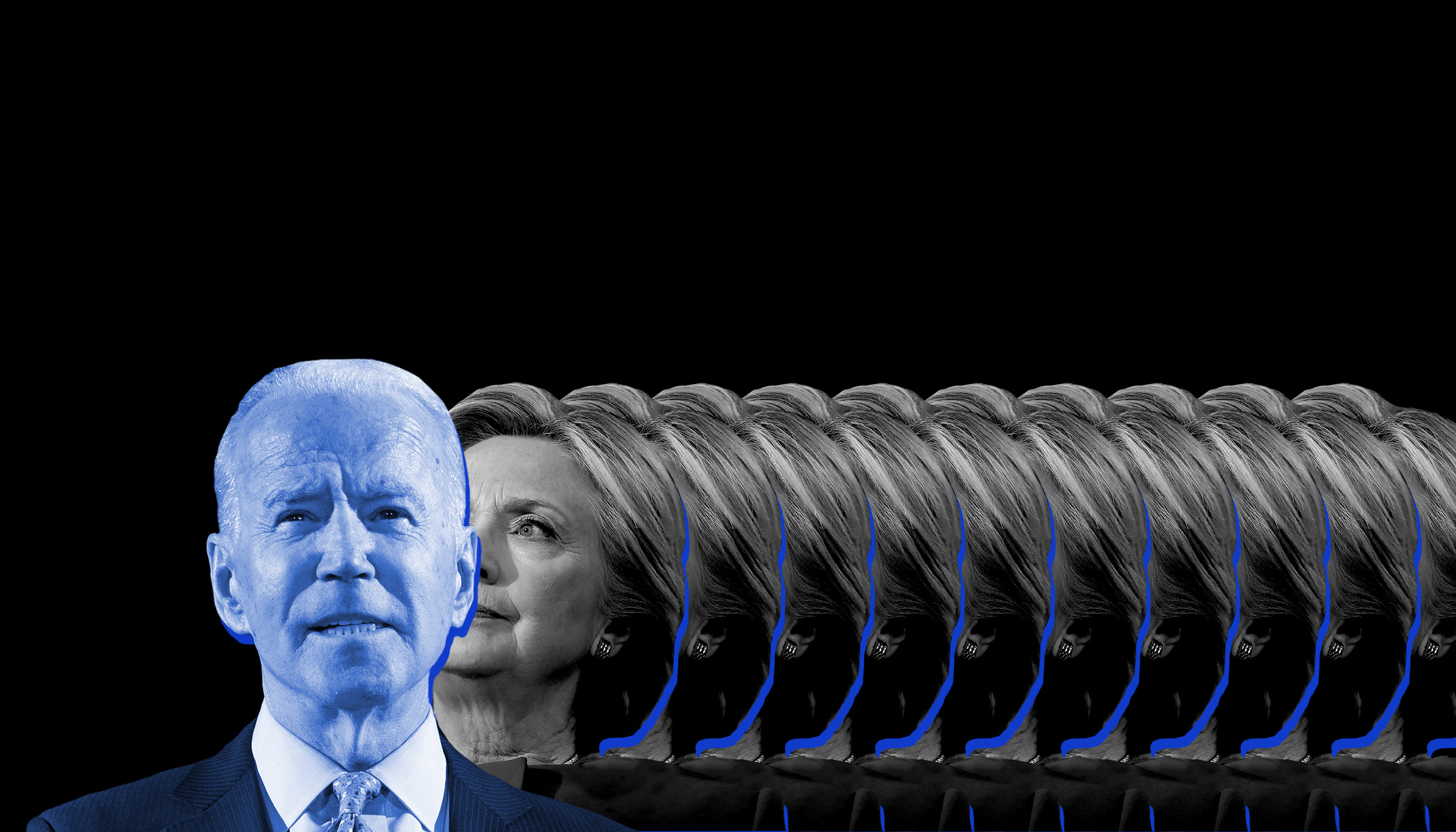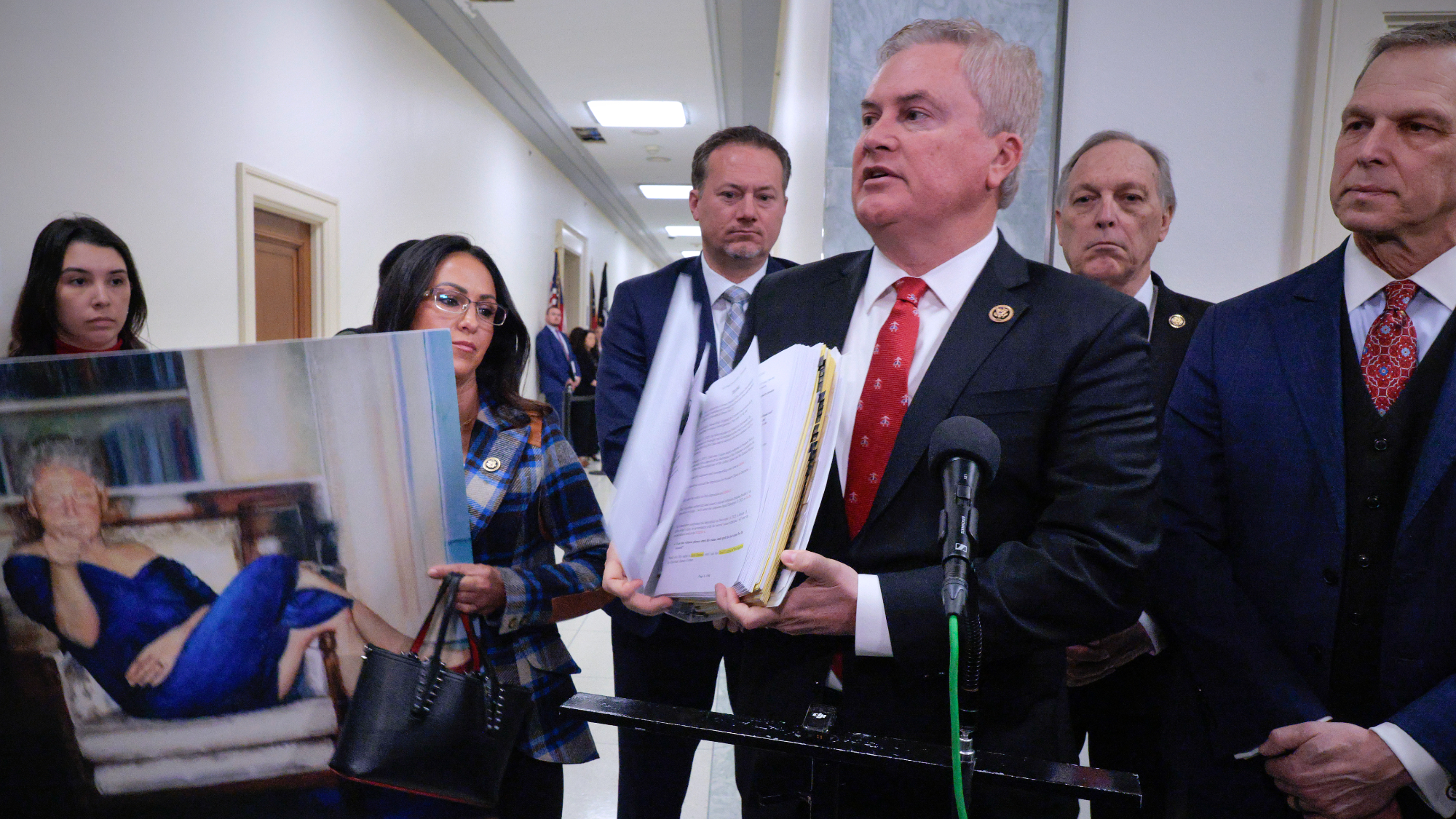The elephant in the room at the DNC
Are Democrats already repeating their 2016 mistakes?


A free daily email with the biggest news stories of the day – and the best features from TheWeek.com
You are now subscribed
Your newsletter sign-up was successful
Four years ago, Hillary Clinton certainly expected she'd be speaking at the Democratic National Convention in 2020. Just not tonight.
The fact that Clinton is part of Wednesday evening's lineup rather than accepting the nomination on Thursday for her re-election bid to the White House should terrify every Democrat. It's also a chilling reminder that Joe Biden's victory is not assured, no matter what polls say and how weak his opponent appears to be. And it raises big questions about what, if anything, the Democrats have learned since the catastrophic results of 2016.
On the one hand, there are good reasons for Democrats to feel hopeful about this November. In every measure, Donald Trump has been a terrible and disastrous president, one who has set Americans against each other, cheapened and demeaned the office of the presidency, and weakened U.S. standing around the world. Rather than working hard for the American people as he promised he'd do back in 2016, Trump has instead wasted countless hours bingeing television and rage-tweeting his endless gripes and grievances to the world. What effort he does expend is mostly to enrich his own finances. Still, his general failures as a leader pale in comparison to the tragedies he has aided in 2020, a devastating year that alone should destroy his chance at re-election. With more than 170,000 Americans dead from coronavirus and an economy in shambles, certainly all Americans should understand the deadly and destructive consequences of giving this man four more years.
The Week
Escape your echo chamber. Get the facts behind the news, plus analysis from multiple perspectives.

Sign up for The Week's Free Newsletters
From our morning news briefing to a weekly Good News Newsletter, get the best of The Week delivered directly to your inbox.
From our morning news briefing to a weekly Good News Newsletter, get the best of The Week delivered directly to your inbox.
Yet that sort of certainty proved ruinous four years ago. That summer, Clinton's polling lead over Trump wasn't as big as Biden holds now, but the Clinton campaign still blew what should have been a gimme election. Clinton's running to the center and shaming Sanders supporters as pie-in-the-sky liberals did nothing to help with non-Democratic voters and likely hampered Democratic turnout. The failure to build a strong ground game in Rust Belt states that Clinton assumed were hers — an assumption Biden also seems dangerously confident about — proved a costly miscalculation. All of this betrayed the Clinton team's overconfidence in its position, deciding it could play things safe and skate to a win.
The shock that Trump did win in 2016 — and the horrors of what his presidency has meant, especially for the most vulnerable — has galvanized historic activism throughout his administration, starting with the Women's March the day after he took office. That activism has seen its most persistent form in the sustained Black Lives Matter movement, a cause that increasing numbers of Americans have embraced, and the 2018 midterm elections showed how enlivened activism could translate into concrete electoral results. High voter turnout, especially from African Americans, ensured big wins for the Democratic Party, a blue wave that saw Democrats winning just about everywhere.
Of course, Hillary Clinton won big in 2016 too, besting Trump by nearly three millions votes. An Electoral College system that heavily advantages Republicans, however, made Trump the president and also suggests that what happened in 2018 can't give much reassurance for how this year plays out. Foreign interests will once again attempt to swing the election, made all the more possible by a Trump administration that has done nothing to stop it. Factor in a global pandemic and the Republican Party's coordinated efforts to suppress voting, seen most recently in Trump's brazen admission that he's blocking financial relief for the U.S. Postal Service in order to help his election chances, and you realize what a steep hill Democrats have to climb.
Can Joe Biden do it? That remains to be seen. One of the biggest criticisms of the last four years has been that the Democratic Party has ignored its left flank, an especially active wing of the party and one that has grown steadily through Trump's time in office, popularizing ideas like Medicare for all, a Green New Deal, and aggressive voting rights expansion. While Bernie Sanders, once again, couldn't nab the nomination, the long primary competition indicated that Biden and the Democrats needed to better incorporate and energize the left in this election than Clinton did four years ago.
A free daily email with the biggest news stories of the day – and the best features from TheWeek.com
In early July, the Biden and Sanders camps were reported to be working together well, with Biden said to be willing to adopt many of Sanders' progressive policy proposals. By the end of the month, that tentative unity appeared to be once again on the rocks, with new skirmishes erupting between the Biden and Sanders teams during a planning meeting for the DNC. Most Americans don't follow these internecine political feuds, which is why televised conventions, even in their altered, virtual format, continue to be one of the best ways for a presidential ticket to show voters what it stands for.
Given the DNC lineup, though, it's hard not to think that the party is using the same playbook as 2016. With a dense roster of moderates, including Sen. Amy Klobuchar, Mayor Pete Buttigieg, Gov. Andrew Cuomo, the Clintons, and the Obamas, plus a slate of Republicans like John Kasich, who promised viewers Monday night that Biden wouldn't "turn sharp left" as president, the 2020 Democratic National Convention seems designed more for pulling non-Democratic voters in than for shoring up the left. The first two nights served to admonish Trump and celebrate Biden's decency but hardly made an argument for any particular solutions to the nation's problems. Even Bernie Sanders appeared to approve of that strategy in his speech Monday night. "As long as I am here,” Sanders said, "I will work with progressives, with moderates, and, yes, with conservatives to preserve this nation from a threat that so many of our heroes fought and died to defeat.”
That may be the right message for 2020, even if it leaves progressives cold. And far more than Hillary Clinton's speech tonight, Kamala Harris' address could be the most important one of this convention. In selecting Harris as his running mate, Biden likely believes her historic candidacy can spur Democratic voters back to Obama-era turnout levels. Picking Harris over, say, Elizabeth Warren, also reveals Biden's enduring centrism, but it may be a shrewd choice too, given how Harris navigated the center-left line better than any other Democratic primary competitors who tried to do so, especially Buttigieg.
With eyes on an even brighter political future for herself, Harris might become a forceful progressive advocate in the Biden administration. But that will first require winning this November. As Sanders made clear on Monday, there is little hope for a progressive future if authoritarianism takes further hold in the country. Those are the plain stakes of this election. Surely Democrats of all stripes, and all rational Americans, frankly, should rally to that critical task.
Neil J. Young is a historian and the author of We Gather Together: The Religious Right and the Problem of Interfaith Politics. He writes frequently on American politics, culture, and religion for publications including The New York Times, The Atlantic, the Los Angeles Times, HuffPost, Vox, and Politico. He co-hosts the history podcast Past Present.
-
 Political cartoons for February 21
Political cartoons for February 21Cartoons Saturday’s political cartoons include consequences, secrets, and more
-
 Crisis in Cuba: a ‘golden opportunity’ for Washington?
Crisis in Cuba: a ‘golden opportunity’ for Washington?Talking Point The Trump administration is applying the pressure, and with Latin America swinging to the right, Havana is becoming more ‘politically isolated’
-
 5 thoroughly redacted cartoons about Pam Bondi protecting predators
5 thoroughly redacted cartoons about Pam Bondi protecting predatorsCartoons Artists take on the real victim, types of protection, and more
-
 Clintons defy House GOP on Epstein subpoenas
Clintons defy House GOP on Epstein subpoenasSpeed Read The House has already received what ‘little information we have,’ the Clintons said
-
 The billionaires’ wealth tax: a catastrophe for California?
The billionaires’ wealth tax: a catastrophe for California?Talking Point Peter Thiel and Larry Page preparing to change state residency
-
 Bari Weiss’ ‘60 Minutes’ scandal is about more than one report
Bari Weiss’ ‘60 Minutes’ scandal is about more than one reportIN THE SPOTLIGHT By blocking an approved segment on a controversial prison holding US deportees in El Salvador, the editor-in-chief of CBS News has become the main story
-
 Has Zohran Mamdani shown the Democrats how to win again?
Has Zohran Mamdani shown the Democrats how to win again?Today’s Big Question New York City mayoral election touted as victory for left-wing populists but moderate centrist wins elsewhere present more complex path for Democratic Party
-
 Millions turn out for anti-Trump ‘No Kings’ rallies
Millions turn out for anti-Trump ‘No Kings’ ralliesSpeed Read An estimated 7 million people participated, 2 million more than at the first ‘No Kings’ protest in June
-
 Ghislaine Maxwell: angling for a Trump pardon
Ghislaine Maxwell: angling for a Trump pardonTalking Point Convicted sex trafficker's testimony could shed new light on president's links to Jeffrey Epstein
-
 The last words and final moments of 40 presidents
The last words and final moments of 40 presidentsThe Explainer Some are eloquent quotes worthy of the holders of the highest office in the nation, and others... aren't
-
 The JFK files: the truth at last?
The JFK files: the truth at last?In The Spotlight More than 64,000 previously classified documents relating the 1963 assassination of John F. Kennedy have been released by the Trump administration
